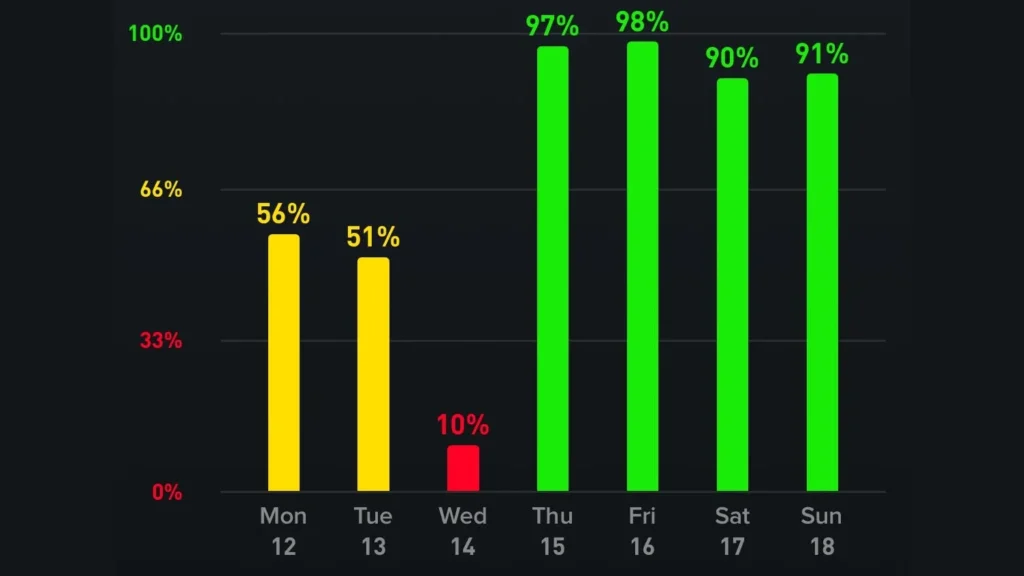
Whoop Recovery (Feb 12-18)
“One word frees us of all the weight and pain in life. That word is love”
Sophocles’s beautiful words from Antigone illuminate the transformative power of love and its ability to alleviate the burdensome aspects of our existence. But is this actually true? Can love truly relieve us from our stress and heal us from our wounds?
Something happened to me a few days ago that made me ask myself that very question. And after digging into the science a bit, to my surprise, Sophocles’ may actually have been on to something 2500 years ago.
Take a look at my WHOOP data in the image below.
Wednesday, February 14 was a big day. At 04:19am that morning, our baby daughter was born. So naturally, we din’t sleep a wink that night and had quite an intense and emotional experience well beyond sunrise (of course, it was MUCH more so for my wife!)
The next three days, Feb 15-17, were spent in the hopsital. My wife and I slept very little and did our best to take some naps between the demands of a newborn baby and visits from nurses, midwives, and doctors. But it was also one of the most beautiful experiences of our lives – filled with outpourings of blissful emotions and indescribable feelings of unconditional love. It was, for both of us, truly magical.
Because of all the stressors and the profound lack of sleep we experienced, I expected those days to look a lot like February 14 – with low recovery scores, low heart rate variability (HRV), and high resting heart rates (RHR). Yet surprisingly, that was far from the case. I actually had better scores than I had in weeks (even though I slept far less and my regular routines were completely disrupted)!
Perplexed, I decided to do some research, which started with learning more about oxytocin’s role in fatherhood.
Oxytocin, colloquially known as the “love hormone” is a neurotransmitter associated with social bonding.
In fathers, it’s been shown to be triggered by a number of activities such as :
- Physical Interaction such as holding, cuddling, or playing
- Positive Social Interactions such as smiling, laughing, and making eye contact
- Caregiving like feeding, bathing, soothing, and changing diapers
- Protecting, providing, or giving support to children
- Vocalizations in a special tone of voice, like “baby talk”
- Co-parenting such as sharing tasks or supporting a spouse in child rearing
I had engaged in every one of those activities over the past four days! But could that have actually increased my health and recovery biomarkers? A little more digging answered that question.
- Oxytocin and Heart Rate Variability (HRV): Oxytocin enhances parasympathetic activity associated with relaxation and stress reduction. This can lead to increased HRV, a marker of cardiovascular health and stress resilience. (Source: Kemp, A. H., & Quintana, D. S. (2013). The relationship between mental and physical health: Insights from the study of heart rate variability. International Journal of Psychophysiology, 89(3), 288-296.)
- Oxytocin and Resting Heart Rate (RHR): Oxytocin modulates autonomic nervous system activity, primarily enhancing parasympathetic tone, which generally leads to a lower RHR, signifying relaxation and reduced stress levels. (Source: Porges, S. W. (2007). The polyvagal perspective. Biological Psychology, 74(2), 116-143; Norman, G. J., et al. (2011). Oxytocin increases autonomic cardiac control: Moderation by loneliness. Biological Psychology, 86(3), 174-180.)
I could cite a ton of other papers. But there’s a relatively strong scientific consensus that parenting triggers oxytocin, and oxytocin enhances parasympathetic activity associated with relaxation and stress reduction.
TL;DR – Love does indeed conquer all!
One more thing…
If you’d like more personalized help unlocking your innate neuroentrepreneurship superpowers, email me here to discuss how I can support you and your team through:
⚡️ 12-Week Neuroentrepreneurship Coaching Program
⚡️ 6-Week Team Flow Training Program
⚡️ One-on-one coaching
⚡️ Workshops & keynotes
